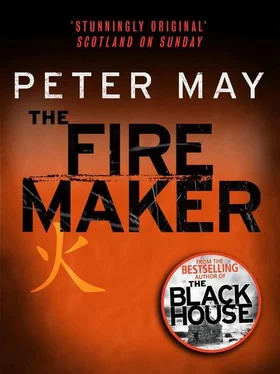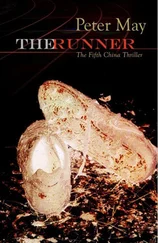Now that the pain had subsided, the effects of the mao tai , on top of the vodka, on top of the twenty-four hours without sleep, were inducing a positive sense of euphoria. When the drinks order came, she asked for beer, and then the food started to arrive, culminating in the carving of three ducks, pieces of which they dipped in hoi sin before wrapping them in very thin pancakes with strips of spring onion, cucumber and minced raw garlic. It was delicious.
They asked her politely about her journey, her hotel. She asked them about their families, their homes. The more beer and wine they drank, the more informal the proceedings and, eventually, the more personal the questions. Mr Cao leaned across the table and said, ‘Forensic pathologists are quite well paid in the USA, I believe.’
Veronica translated for the others, and Margaret replied, ‘Everything is relative, Mr Cao. I’m sure in terms of Chinese salaries you would think so. But you must remember, the cost of living is so much higher in the United States.’
Mr Cao nodded. ‘And how much do you earn, Dr Campbell?’ In spite of Bob’s warning, Margaret was still taken aback by the direct and personal nature of the question.
Dr Mu passed some comment and everyone around the table laughed. Veronica translated, ‘Dr Mu say, when the wine is in, the truth is out.’
Well, thought Margaret, if they want to know… ‘I make around eighty-five thousand dollars a year,’ she said.
In the silence that followed, she could almost hear the computations going on in their heads. Eyes widened, jaws dropped, and there was no doubting that they were genuinely shocked by the extreme wealth of the yangguizi whose dinner they were paying for. Margaret began to wish she’d told them she’d promised her father to keep it a secret.
A tasty consommé arrived, boiled up from the carcasses of their ducks, and then a huge platter of fried rice. Margaret finished her beer and helped herself to some rice as Dr Mu’s husband asked, ‘So, Dr Campbell, you are forensic pathologist?’
‘That’s right.’
‘And do you have any, ah, special area, ah, expertise?’
‘Sure. Burn victims.’ She looked around their expectant faces. They were waiting for her to continue. ‘People who die in fires. I was just training at the time, but I was an assistant to one of the pathologists they called in to Waco, Texas, to help identify the corpses — you know, all those victims of the fire. That’s where my interest started, I guess. Funny thing is, the first few times you do an autopsy on a burn victim, the smell of charred human flesh stays with you for days. Now I don’t even notice it.’ She took a mouthful of rice and saw that everyone else around the table was putting their chopsticks down.
Veronica, who had been translating, had turned very pale. She rose quickly. ‘Excuse me,’ she said, and hurried away in the direction of the toilets.
‘Could I have another beer?’ Margaret asked the waitress.
‘And I’ll have a large Scotch.’ Heads turned as McCord pulled a chair from another table and drew it into theirs. He was quite unsteady on his feet and very flushed. ‘Fancy meeting you here,’ he grinned lecherously at Margaret and sat down. ‘You good folks don’t mind if I join you for a dee-jest-eef?’
Stony faces greeted him around the table. Mr Cao leaned over and whispered something to Professor Jiang, who contained his anger with a curt nod. Bob gave Margaret a long, hard look. She shrugged. McCord leaned towards her. ‘So, Margaret Campbell… how was your Beijing Duck?’
Mr Cao rounded the table and stooped to whisper in McCord’s ear, eliciting an indignant outburst. ‘Well, hell! That’s not very hospitable!’
Bob stood up and took one of his arms. ‘I think maybe you’ve had a little too much to drink, Dr McCord.’
McCord pulled his arm free. ‘How the hell would you know how much I’ve had to drink?’
Margaret tugged at Bob’s sleeve. ‘Who is he?’ she whispered.
‘I thought you knew,’ he said coldly. ‘He seems to know you.’
She shook her head. ‘He tried to pick me up at the hotel.’
‘I’ll tell you who I am.’ McCord pushed his snout between them. ‘I’m the man that’s feeding this goddamn country.’
Mr Cao shrugged helplessly towards Professor Jiang, who nodded and waved at him to sit down. Bob said, ‘Dr McCord was responsible for developing China’s super-rice. You’ve probably heard about it. They introduced it as a crop about three years ago. Since when production has increased by… what… fifty per cent?’
‘A hundred,’ McCord corrected him. ‘Indestructible, you see. Disease-resistant, herbicide-resistant, insect-resistant. You name it. I made it that way.’
‘And no doubt it tastes as good as it always did.’ Margaret couldn’t conceal her scepticism.
‘You tell me. You’re eating it.’ McCord grinned as Margaret took in the bowl of rice in front of her.
‘Perhaps you should have some of it yourself, then — to soak up the alcohol.’
He laughed. ‘Never touch the stuff.’
The waitress arrived with his whisky and Margaret’s beer. She watched him guzzle thirstily and, through her fatigue and a haze of alcohol, a vague and distant memory was beginning to surface, attached to other things she would rather forget. ‘McCord,’ she said. ‘Dr James McCord.’
‘That’s me.’
‘You got kicked out of… where was it… the Boyce Thompson Institute at Cornell University? About six years ago?’
McCord’s complexion darkened. ‘Those fucking people!’
‘Field-testing genetically engineered plants without a permit from the EPA. Something like that, wasn’t it?’
McCord hammered a clenched fist on the table and everyone jumped. ‘Fucking regulations! They got our people so tied up in them they can’t move. Paperwork, bureaucracy, everything takes so goddamn long, by the time we get permission for a field test, the rest of the world’s growing the stuff.’ He grabbed a bowl of rice. ‘This. We could have been growing this. Or wheat. Or corn. Feeding the planet. Instead, it takes a third world country like China to have the vision.’
Those Chinese around the table who understood English bristled at his description of their country as ‘third world’.
‘So it was the Chinese who financed your research?’ Margaret was curious.
‘Hell, no. They just facilitated it. It was my employers, Grogan Industries, put up the money. Good old-fashioned capitalist high-risk investment. They did the deal with China. Strange bedfellows, huh? But, boy, did they both hit the jackpot.’
‘How?’
‘Well, it’s obvious, isn’t it? The Chinese got a quarter of the world’s population. And for the first time in their history they can feed themselves. Hell, they’re growing so much rice now they’re exporting the stuff.’
‘And Grogan Industries?’
‘They got the patent on all my work. They’re going to be launching my rice all over Asia and India next year.’
Margaret had heard of Grogan, a multinational US-based biotech company with an unsavoury reputation for ruthlessly exploiting the pharmaceutical market in the third world.
‘And no doubt the poorest countries — those with the greatest need — will be the last to get it. Because I’ll bet your technology doesn’t come cheap, does it, Dr McCord?’
‘Hey!’ He threw his hands up in self-defence. ‘Don’t blame me. The sole purpose of the scientist is to work for the benefit of mankind.’ He grinned. ‘Or something. But it’s money that makes the world go round.’
‘Yeah, and it’s money and vested interests that persuade politicians and governments not to put sensible constraints on the work of people like you.’ Margaret’s passion was born of years of argument and discussion, and it was resurfacing now in a blur of painful memories.
Читать дальше












